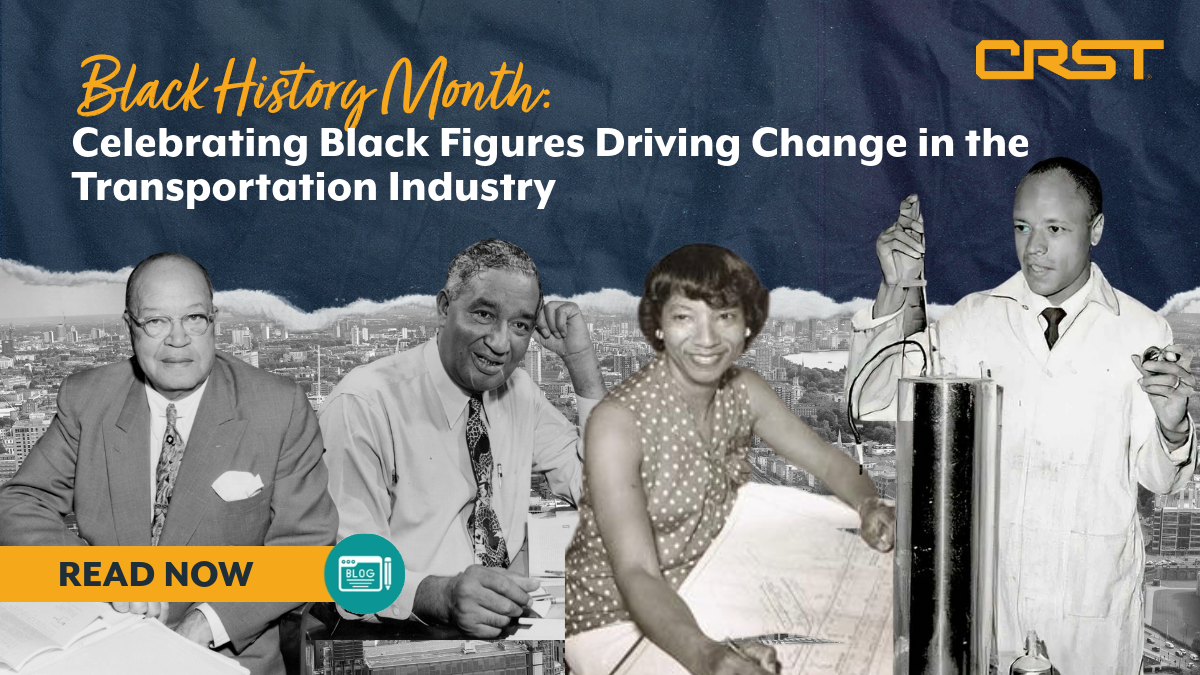February is Black History Month — a month that focuses attention on the contributions of African Americans in the United States. Since 1976, every U.S. president has officially chosen February as Black History Month. At CRST, we honor the honor many African Americans who have touched the transportation industry and our lives.
Andrew Jackson Beard was an inventor who was instrumental in reducing severe injuries to railroad workers. He invented the first automatic railroad car coupler—a forerunner of automatic couplers used today. His invention was so impactful in that by 1887, it became illegal to operate railroad carts without it.
Frederick McKinley Jones invented the first successful system for mobile refrigeration—a portable air-cooling unit for trucks, which significantly improved the long-haul transportation of perishable goods. In fact, long-haul refrigerated transit wouldn’t be possible without his contribution. His invention earned him the National Medal of Technology and an induction into the National Inventors Hall of Fame.
Archie Alexander was an American architect and engineer and an early African American graduate of the University of Iowa. He was the first to graduate from the University of Iowa’s College of Engineering and was a governor of the U.S. Virgin Islands. Alexander founded Alexander & Repass, an engineering firm responsible for constructing the Whitehurst Freeway, the Tidal Basin Bridge and the extension of the Baltimore-Washington Parkway. His bridges and roads are still used today.
Elijah J. McCoy was a Canadian American engineer born to fugitive U.S. slaves who invented lubrication systems for steam engines. In 1920, McCoy sold the rights to some of his patents to raise money to open the Elijah McCoy manufacturing company. The term “The Real McCoy” can be attributed to this masterful engineer.
Granville T. Woods, a pioneering African American inventor with 60 patents, overcame racial barriers to revolutionize electrical engineering. Self-taught due to exclusion from libraries, he created groundbreaking innovations like the induction telegraph and multiplex telegraph. Known as the “Black Edison,” Woods fiercely defended his independence, advancing technology and Black excellence.
Richard Spikes invented many products over 40 years, most of which were in the transportation industry. In 1932, he received a patent for improving the gear shift transmission system. This invention kept the gears in constant mesh for various speeds, improving automatic transmission. In 1962, he received the patent for the automated safety brake system. This invention would be necessary in automotive history as it supplied reserve braking action in case of damage to the standard braking means. Spikes’ invention is still used in some buses today as a fail-safe means of stopping vehicles.
Meredith Gourdine, a trailblazing African American inventor and Olympic silver medalist in long jump, broke barriers in science and engineering. He revolutionized environmental technology with innovations like the catalytic converter and founded Gourdine Laboratories. With degrees from Cornell and Caltech, Gourdine’s achievements exemplify Black excellence, blending athletic prowess and groundbreaking contributions to global progress.
Lois Cooper made history in 1953 by becoming the first female African American transportation engineer to be hired in the Engineering Department at the California Department of Transportation (Caltrans). She went on to figure out the alignment of freeways by determining the bearings and coordinates to create a draft for construction managers. She did this without calculators or computers.
Want to learn more about trucking through the ages? Check out our blog “Trucking Through The Ages: A Brief History of the Truck Driving Industry and its Trailblazers.”





